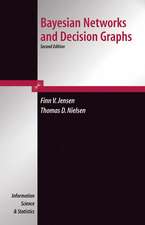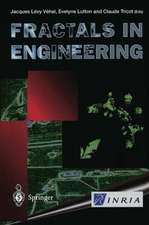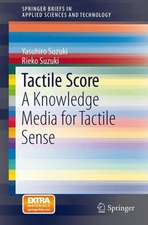Regulated Open Multi-Agent Systems (ROMAS): A Multi-Agent Approach for Designing Normative Open Systems
Autor Emilia Garcia, Adriana Giret, Vicente Bottien Limba Engleză Hardback – 9 oct 2014
Presenting a software engineering approach which covers both the analysis and design of these kinds of systems, and which deals with the open issues in the area, ROMAS (Regulated Open Multi-Agent Systems) defines a specific multi-agent architecture, meta-model, methodology and CASE tool. This CASE tool is based on Model-Driven technology and integrates the graphical design with the formal verification of some properties of these systems by means of model checking techniques.
Utilizing tables to enhance reader insights into the most important requirements for designing normative open multi-agent systems, the book also provides a detailed and easy to understand description of the ROMAS approach and the advantages of using ROMAS. This method is illustrated with case studies, in which the reader may develop a comprehensive understanding of applying ROMAS to a given problem. The case studies are presented with illustrations of the developments.
Reading this book will help readers to understand the increasing demand for normative open systems and their development requirements; understand how multi-agent systems approaches can be used to deal with the development of systems of this kind; to learn an easy to use and complete engineering method for large-scale and complex normative systems and to recognize how Model-Driven technology can be used to integrate the analysis, design, verification and implementation of multi-agent systems.
| Toate formatele și edițiile | Preț | Express |
|---|---|---|
| Paperback (1) | 638.69 lei 6-8 săpt. | |
| Springer International Publishing – 10 sep 2016 | 638.69 lei 6-8 săpt. | |
| Hardback (1) | 644.98 lei 6-8 săpt. | |
| Springer International Publishing – 9 oct 2014 | 644.98 lei 6-8 săpt. |
Preț: 644.98 lei
Preț vechi: 806.23 lei
-20% Nou
Puncte Express: 967
Preț estimativ în valută:
123.43€ • 134.03$ • 103.68£
123.43€ • 134.03$ • 103.68£
Carte tipărită la comandă
Livrare economică 22 aprilie-06 mai
Preluare comenzi: 021 569.72.76
Specificații
ISBN-13: 9783319115719
ISBN-10: 3319115715
Pagini: 151
Ilustrații: VII, 151 p. 57 illus.
Dimensiuni: 155 x 235 x 17 mm
Greutate: 0.4 kg
Ediția:2015
Editura: Springer International Publishing
Colecția Springer
Locul publicării:Cham, Switzerland
ISBN-10: 3319115715
Pagini: 151
Ilustrații: VII, 151 p. 57 illus.
Dimensiuni: 155 x 235 x 17 mm
Greutate: 0.4 kg
Ediția:2015
Editura: Springer International Publishing
Colecția Springer
Locul publicării:Cham, Switzerland
Public țintă
ResearchCuprins
1.-Introduction 2.-Requirements for designing normative open multiagent systems 3.- State of the art 4.- ROMAS approach overview 5.-ROMAS modeling language 6.-ROMAS methodology 7.- ROMAS development framework 8.- ROMAS approach evaluation .9.- Conclusions
Notă biografică
Dr. Emilia Garcia is a researcher of the Department of Computer Systems and Languages at the Universitat Politècnica de València (UPV), Spain. She is member of the research group Grupo de Tecnología Informática – Inteligencia Artificial (GTI-IA) with current research interests encompassing software engineering techniques for multi-agent systems, model-driven technology, formal verification of models, intelligent systems, normative systems and agreement technologies.
Dr. Garcia has been working at the Universitat Politècnica de València as a researcher since 2005. During this time, she has been awarded with several grants in competitive calls including the “FPU – Formación para el Profesorado Universitario” from the Ministry of Education of the Spanish government.
Dr. Adriana Giret is an Associate Professor of the Department of Computer Systems and Languages at the Polytechnic University of Valencia (UPV), Spain. She is member of the research group Grupo de Tecnología Informática – Inteligencia Artificial (GTI-IA), The Department of Computer Systems and Languages (DSIC) and has teaching responsibilities in twelve UPV centres.
Adriana Giret teaches in the School of Industrial Design Engineering and her current research activities include two interdisciplinary areas: Distributed Intelligent Systems and Manufacturing Systems.
Vicent J. Botti Navarro received his Ph. D. from the Universitat Politècnica de València (UPV) in 1990. He holds a position of Full Professor of Computer Sciences at the Universitat Politècnica de València where he has been teaching since 1984.
Professor Botti is Head of Grupo de Tecnología Informática-Inteligencia Artificial and Vice-Rector for the Development of ITC Technologies at the Universitat Politècnica de València (UPV), Spain. He teaches undergraduate and master courses in Artificial Intelligence at the Escola Tècnica Superior d’Enginyeria Informàtica at theUPV.
Professor Botti has worked on different areas of Artificial Intelligence since 1984.
Dr. Garcia has been working at the Universitat Politècnica de València as a researcher since 2005. During this time, she has been awarded with several grants in competitive calls including the “FPU – Formación para el Profesorado Universitario” from the Ministry of Education of the Spanish government.
Dr. Adriana Giret is an Associate Professor of the Department of Computer Systems and Languages at the Polytechnic University of Valencia (UPV), Spain. She is member of the research group Grupo de Tecnología Informática – Inteligencia Artificial (GTI-IA), The Department of Computer Systems and Languages (DSIC) and has teaching responsibilities in twelve UPV centres.
Adriana Giret teaches in the School of Industrial Design Engineering and her current research activities include two interdisciplinary areas: Distributed Intelligent Systems and Manufacturing Systems.
Vicent J. Botti Navarro received his Ph. D. from the Universitat Politècnica de València (UPV) in 1990. He holds a position of Full Professor of Computer Sciences at the Universitat Politècnica de València where he has been teaching since 1984.
Professor Botti is Head of Grupo de Tecnología Informática-Inteligencia Artificial and Vice-Rector for the Development of ITC Technologies at the Universitat Politècnica de València (UPV), Spain. He teaches undergraduate and master courses in Artificial Intelligence at the Escola Tècnica Superior d’Enginyeria Informàtica at theUPV.
Professor Botti has worked on different areas of Artificial Intelligence since 1984.
Textul de pe ultima copertă
Addressing the open problem of engineering normative open systems using the multi-agent paradigm, normative open systems are explained as systems in which heterogeneous and autonomous entities and institutions coexist in a complex social and legal framework that can evolve to address the different and often conflicting objectives of the many stakeholders involved.
Presenting a software engineering approach which covers both the analysis and design of these kinds of systems, and which deals with the open issues in the area, ROMAS (Regulated Open Multi-Agent Systems) defines a specific multi-agent architecture, meta-model, methodology and CASE tool. This CASE tool is based on Model-Driven technology and integrates the graphical design with the formal verification of some properties of these systems by means of model checking techniques.
Utilizing tables to enhance reader insights into the most important requirements for designing normative open multi-agent systems, the book also provides a detailed and easy to understand description of the ROMAS approach and the advantages of using ROMAS. This method is illustrated with case studies, in which the reader may develop a comprehensive understanding of applying ROMAS to a given problem. The case studies are presented with illustrations of the developments.
Reading this book will help readers to understand the increasing demand for normative open systems and their development requirements; understand how multi-agent systems approaches can be used to deal with the development of systems of this kind; to learn an easy to use and complete engineering method for large-scale and complex normative systems and to recognize how Model-Driven technology can be used to integrate the analysis, design, verification and implementation of multi-agent systems.
Presenting a software engineering approach which covers both the analysis and design of these kinds of systems, and which deals with the open issues in the area, ROMAS (Regulated Open Multi-Agent Systems) defines a specific multi-agent architecture, meta-model, methodology and CASE tool. This CASE tool is based on Model-Driven technology and integrates the graphical design with the formal verification of some properties of these systems by means of model checking techniques.
Utilizing tables to enhance reader insights into the most important requirements for designing normative open multi-agent systems, the book also provides a detailed and easy to understand description of the ROMAS approach and the advantages of using ROMAS. This method is illustrated with case studies, in which the reader may develop a comprehensive understanding of applying ROMAS to a given problem. The case studies are presented with illustrations of the developments.
Reading this book will help readers to understand the increasing demand for normative open systems and their development requirements; understand how multi-agent systems approaches can be used to deal with the development of systems of this kind; to learn an easy to use and complete engineering method for large-scale and complex normative systems and to recognize how Model-Driven technology can be used to integrate the analysis, design, verification and implementation of multi-agent systems.
Caracteristici
Analyzes the specific requirements for designing normative open systems and discusses to what extent current agent methodologies support it Presents a software engineering approach that covers the analysis and design of these kinds of systems Provides a detailed and easy to understand description of the ROMAS approach Includes supplementary material: sn.pub/extras














